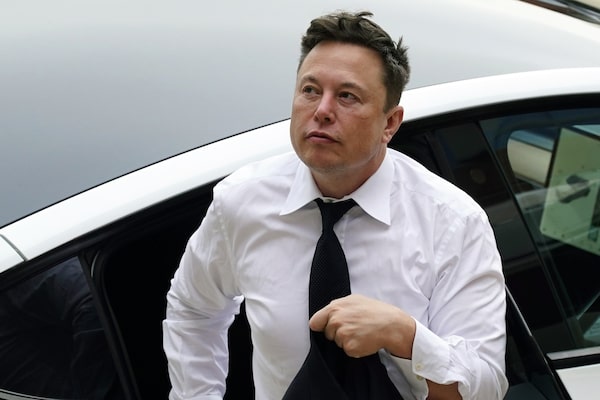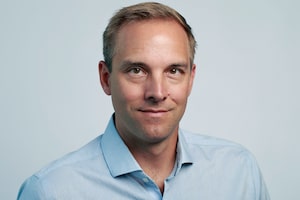
Those watching Elon Musk have struggled to match his visionary rhetoric with Twitter’s daily tumult.Matt Rourke/The Associated Press
The Twitter Rory Capern knew made money in a few main ways. It sold ads. It raised revenue from subscriptions. And it sought to profit from data about its users.
But in nearly 50 days under the ownership of Elon Musk, Twitter has lost advertisers, bobbled a subscription offering and laid off marketers previously dedicated to bringing in cash.
In this opening act, at least, “the three monetization opportunities for Twitter I’m used to focusing on have all been very strangely managed,” said Mr. Capern, former managing director of Twitter Canada.
“From a strategic perspective, I don’t see the plan.”
Since his purchase of Twitter, Mr. Musk has fired countless people, some seemingly on a whim. He has auctioned furniture and a sculpture of the Twitter bird. He has cheered the leak of internal e-mails to sympathetic journalists. He has taunted liberal critics and promised new transparency, while gutting the company’s moderation and legal teams. He has promised to preserve an account that tracks his private jet, then suspended it, then briefly revived it, then banished it again. He has booted journalists, excised links to a competing social media service and suspended Twitter Spaces, an online digital meeting room where some of those journalists had questioned him.
But if any of this qualifies as madness, does it belie a method?
Here’s how Twitter has changed since Elon Musk took over as CEO
Elon Musk’s Twitter suspension of journalists draws global backlash
Such an intent has been difficult to discern from the upheaval at what remains of the company’s headquarters in San Francisco, its interior now newly outfitted with beds for engineers on long shifts.
Mr. Musk, however, has been candid about what he wants for his newest acquisition. It is a vision that would place Twitter – and him – at the apex of a company that is as dominant in social media as Tesla is in electric cars. At its core, he believes making Twitter more trusted and trustworthy – in part by dispatching the “moral framework of San Francisco” that he sees as its too-liberal Achilles – will enhance its appeal and grow its user base.
Provide “the most truthful, accurate and timely information to people” he said on a recent Twitter Spaces chat – before he suspended its function – and “then I think Twitter will compete more effectively than any other source of information, and then more and more people will use Twitter.”
Twitter, he said, needs to welcome long-form written content, videos and audio, with the ability for creators to cash in and users to exchange money. “I feel like I’m saying the sky is blue and the grass is green. It’s pretty obvious stuff,” he said, describing what it will take for Twitter to take on YouTube.
It’s also, he said, “kind of a no-brainer for Twitter to have payments – both fiat currency and crypto – and to make that simple for people to use.” On that front, “WeChat has a lot of functionality that Twitter should have.”
WeChat is the Chinese super-app that has become home to much of that country’s digital life. YouTube, meanwhile, has been the global gold standard for user-generated content.
YouTube, however, has proven tough to replicate – even its founders failed to create a competitor. YouTube is also fundamentally unlike Twitter, whose fast-moving feed does not encourage the kind of sit-down viewing YouTube provides.
And modelling WeChat could mean fundamentally changing Twitter, whose online “public square” may not fit well with a platform for commerce and private, encrypted communication. “I think he is literally abandoning the public square idea,” said Kirstine Stewart, the founding head of Twitter Canada who was subsequently the company’s vice-president of media.
But most social media platforms lust after the super-app idea. “The Holy Grail is being able to keep a user on the platform without leaving,” Ms. Stewart said.
Take WeChat’s owner, Tencent Holdings Ltd., which has “all the data on who is connected to whom, what people are reading, sharing, saying. Their location. How they move,” said Martin Chorzempa, author of The Cashless Revolution.
“It’s just an extraordinary degree of centralized power.”
But Tencent itself has largely failed to expand WeChat beyond China, where it achieved dominance by providing a novel way to socially connect an entire country, then leap-frogging moribund banks with a seamless way to move money. (Facebook, too, has struggled to emulate WeChat, including with the failure of its cryptocurrency.)
Twitter has nowhere near WeChat’s dominance in any of the markets where it operates and to succeed in payments, would have to demonstrate convenience that eclipses that of the credit card. “Twitter would run into many difficulties if they were really to model themselves after the WeChat platform,” said Ashley Dudarenok, a China digital expert.
Then there are the problems with such a concentration of control. “I have a real hard time with any single owner of Twitter,” Mr. Capern said. “It is just that powerful of a tool.”
That’s not to count out Mr. Musk, who has never minded a mess. “The best way to speed up results is to let things kind of break – and then you really figure out, how do we fix it?” Mr. Eves said. He praised Mr. Musk’s work to push bots off the platform. Other solutions may prove easy, he noted. YouTube’s biggest stars, including MrBeast, are already on Twitter. To get them to make content for Twitter, “just turn on monetization,” Mr. Eves said.
Still, those watching Mr. Musk have struggled to match his visionary rhetoric with Twitter’s daily tumult.
“It’s very easy for us to try and situate Elon Musk’s weird decisions in some sort of 3D chess game,” said Chris Stokel-Walker, who has written books on the rise of YouTube and TikTok. “When actually, it’s probable he just doesn’t know what he’s doing minute to minute.”
 Nathan VanderKlippe
Nathan VanderKlippe